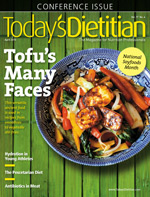 April 2015 Issue
April 2015 Issue
CPE Monthly: Can Lifestyle Changes Improve Erectile Dysfunction?
By Jamie Leff, MS, RD
Today's Dietitian
Vol. 17 No. 4 P. 44
Tip Sheet
Lifestyle Changes to Improve Erectile Dysfunction
Studies suggest there's a link between erectile dysfunction and high cholesterol, heart disease, diabetes, and obesity. The following recommendations may help avoid or improve existing erectile dysfunction.
• Determine your ideal weight by talking to your dietitian or physician. The higher your BMI, the higher your risk of developing erectile dysfunction, and losing weight could improve existing erective dysfunction.
• Exercise regularly. Always check with your physician before starting any exercise program to ensure it's medically safe for you. When you begin, start slowly, working your way up to 30 minutes of aerobic exercise five to six days per week. Even walking for 10 minutes three times per day can be beneficial.
• Lower your cholesterol. Recommendations call for total cholesterol levels to be below 200. Have your cholesterol checked regularly, and if it's high, initiate lifestyle changes including diet and exercise that can help reduce it.
• Eat a healthful diet. Fruits and vegetables should constitute the bulk of your diet, and you should strive to eat a variety of different colored ones each day. (Note: Men who are advised by an RD and follow a personalized health program tend to see more results.)
• Choose whole grains such as brown rice, quinoa, and sprouted wheat bread. These provide more nutrition than their white counterparts.
• Eat nuts and seeds. Keep 1-oz packs of almonds in your desk for an afternoon snack, or spread almond butter on a slice of sprouted wheat bread for a quick and easy breakfast. Nuts and seeds are good sources of fiber and healthful fats.
• Watch your intake of unhealthful fats. The Mediterranean diet calls for the use of olive or grapeseed oils when cooking instead of butter or canola oil. Grapeseed oil is preferable for cooking because of its higher flash point. Try to avoid processed foods that contain trans fats.
• Spice up your food. Use fresh herbs and spices instead of salt to flavor your meals.
• Be picky about your proteins. Reduce your red meat intake to once or twice per month. Make the majority of your protein sources lean ones such as chicken or turkey. Try to consume fish twice per week.
